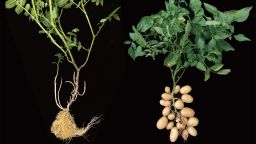Science
Wild Tomatoes in Galápagos Challenge Evolutionary Concepts

In a groundbreaking discovery, researchers have found that a wild tomato species in the Galápagos Islands appears to exhibit characteristics of reverse evolution. The plant, known scientifically as Solanum pennellii, was first studied in 2024 during an investigation into alkaloids—natural compounds that serve as a plant’s defense mechanism against pests.
Located hundreds of miles off the coast of Ecuador, the Galápagos Islands have long been a focal point for evolutionary research, stemming from their association with Charles Darwin. In this recent study, scientists observed that tomatoes from the younger, western islands of the archipelago were producing alkaloids not seen in tomato plants for millions of years. This sparked intrigue as researchers compared these findings with samples from the older eastern islands, which had developed a modern defense system.
According to Adam Jozwiak, a molecular biochemist at the University of California, Riverside and a member of the research team, the findings indicate that the western tomatoes might not simply be behind in their evolutionary journey. Instead, they may represent a case of “reverse evolution.” Jozwiak stated, “It’s not very common to see reverse evolution,” highlighting the flexibility of nature in its evolutionary processes.
The research, published in the journal Nature Communications in June, revealed that the western tomatoes appeared to possess a molecular fingerprint similar to that of eggplants, another member of the nightshade family. Modern tomatoes typically do not produce eggplant alkaloids; however, the western Solanum pennellii seem to have reverted to this ancestral state.
Understanding these molecular changes could lead to advancements in agricultural practices, such as the development of more resilient crops and effective pesticides. Jozwiak noted that the study of these ancient genes could not only enhance crop production but also contribute to insights into the evolution of other species, including humans.
Evolution and Environmental Factors
The Solanum pennellii species is believed to have originated in South America and likely arrived in the Galápagos Islands via birds carrying its seeds 1 to 2 million years ago. The evolution of the plant has occurred within the last half million years, coinciding with the formation of the younger islands due to volcanic activity. The environment on the eastern islands is characterized by stability and biodiversity, while the younger islands present harsher conditions, including less developed soil.
Jozwiak speculated that the ancient molecular composition of these tomatoes not only aids in pest deterrence but may also enhance nutrient absorption and disease resistance. Researchers found that a simple alteration in amino acid composition triggered the reversion to ancestral traits. They further tested this hypothesis by genetically modifying tobacco plants to replicate the ancestral compounds, confirming the underlying mechanisms.
Anurag Agrawal, an evolutionary ecologist at Cornell University, emphasized that the tomato case illustrates how plants can evolve diverse chemical traits under varying environmental conditions. He pointed out that evolutionary biology often involves unexpected detours, including reversions, which can be seen in various species, such as flightless birds and aquatic mammals that have lost certain traits.
Challenging Established Evolutionary Principles
While the concept of reverse evolution is contentious, Jozwiak’s findings challenge traditional notions in evolutionary biology, such as Dollo’s Law, which posits that once a trait is lost, it cannot re-emerge in the same form. Eric Haag, a professor of biology at the University of Maryland, remarked that the research represents a challenge to this law, as the specific amino acid changes observed in the Galápagos species align with traits found in more distant ancestors.
Despite the potential implications of these findings, scientists agree that further research is necessary to fully understand the mechanisms behind this phenomenon. There are still questions regarding the timing and environmental factors that led to this reversion. While the alkaloids produced by these tomatoes are not safe for human consumption, studying their properties could open avenues for controlling these compounds in agricultural contexts.
Jozwiak expressed a desire to return to the islands to continue investigating the tomatoes and their interactions with insects, as well as other traits influenced by ancient molecular structures. As the research progresses, it may pave the way for a deeper understanding of evolutionary processes and the adaptability of various species, including potential implications for humans and how we might also exhibit latent ancestral traits.
The ongoing exploration of these wild tomatoes not only enriches our understanding of evolution but also underscores the dynamic nature of adaptation in response to changing environmental conditions. As researchers delve deeper into these findings, they may uncover even more about the complexities of evolution and the potential for traits to emerge in surprising ways.
-

 World2 weeks ago
World2 weeks agoGlobal Air Forces Ranked by Annual Defense Budgets in 2025
-

 World2 weeks ago
World2 weeks agoMass Production of F-35 Fighter Jet Drives Down Costs
-

 Top Stories2 weeks ago
Top Stories2 weeks agoNew ‘Star Trek: Voyager’ Game Demo Released, Players Test Limits
-

 Top Stories2 weeks ago
Top Stories2 weeks agoDirecTV to Launch AI-Driven Ads with User Likenesses in 2026
-

 Science2 weeks ago
Science2 weeks agoTime Crystals Revolutionize Quantum Computing Potential
-

 World2 weeks ago
World2 weeks agoElectrification Challenges Demand Advanced Multiphysics Modeling
-

 Entertainment2 weeks ago
Entertainment2 weeks agoFreeport Art Gallery Transforms Waste into Creative Masterpieces
-

 Lifestyle2 weeks ago
Lifestyle2 weeks agoDiscover Reese Witherspoon’s Chic Dining Room Style for Under $25
-

 Health2 weeks ago
Health2 weeks agoGavin Newsom Critiques Trump’s Health and National Guard Plans
-

 Lifestyle2 weeks ago
Lifestyle2 weeks agoLia Thomas Honored with ‘Voice of Inspiration’ Award at Dodgers Event
-

 Science2 weeks ago
Science2 weeks agoWaning Crescent Moon: What to Expect on October 17
-

 Entertainment2 weeks ago
Entertainment2 weeks agoFast & Furious Coaster Hits the Track at Universal Studios









